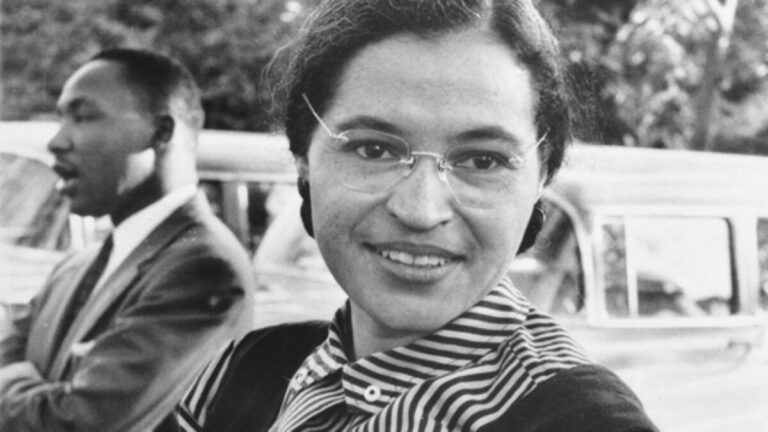Rosa Parks is often hailed as the “Mother of the Civil Rights Movement,” a title that reflects her pivotal role in the fight for racial equality in the United States. But who was Rosa Parks beyond her moment of defiance on a Montgomery bus? This article delves into her life, her contributions to the civil rights movement, and her enduring legacy.
Early Life
Rosa Louise McCauley was born on February 4, 1913, in Tuskegee, Alabama. Growing up in the segregated South, Parks experienced firsthand the injustices faced by African Americans. Her mother, Leona, was a schoolteacher, and her father, James, was a carpenter. They instilled in her the importance of education and social justice from an early age.
Parks attended a laboratory school for African Americans at Alabama State University, where she began to understand the systemic racism that permeated every aspect of life in the South. After her education was interrupted due to her family’s financial struggles, she moved to Montgomery, where she worked as a seamstress.
The Moment of Defiance
The most famous moment of Rosa Parks’s life occurred on December 1, 1955, when she refused to give up her seat to a white passenger on a Montgomery bus. This act of defiance was not spontaneous; it was a calculated decision made by a woman who had been involved in civil rights activism for years.
Parks was an active member of the National Association for the Advancement of Colored People (NAACP) and had previously attended training sessions on civil disobedience. Her refusal to move not only resulted in her arrest but also sparked the Montgomery Bus Boycott, a pivotal event in the civil rights movement.
The Montgomery Bus Boycott
The Montgomery Bus Boycott was organized in response to Parks’s arrest. Led by figures such as Dr. Martin Luther King Jr., the boycott lasted for 381 days. During which African Americans refused to use the city buses. This collective action put significant financial pressure on the bus company and drew national attention to the issue of segregation.
The boycott not only challenged the discriminatory laws of the time but also served as a model for future civil rights activism. It showcased the power of nonviolent protest and community solidarity, proving that collective action could lead to meaningful change.
The Aftermath and Legacy
Rosa Parks’s bravery inspired countless others to join the fight for civil rights. After the boycott, she faced threats and harassment in Montgomery, prompting her and her husband to relocate to Detroit, Michigan. Despite the challenges, Parks continued her activism, working alongside other leaders in the civil rights movement.
Parks’s contributions extended beyond her initial act of defiance. She participated in marches, advocated for the Voting Rights Act, and worked with various organizations to promote social justice. Her commitment to equality and her tireless work made her an icon of the movement.
Recognition and Honors
Rosa Parks’s impact has been recognized in numerous ways. In 1999, she was awarded the Congressional Gold Medal, one of the highest civilian honors in the United States. Parks was also awarded the Presidential Medal of Freedom in 1996. Her legacy lives on through various memorials, including the Rosa Parks Library and Museum in Montgomery and the Rosa Parks statue in the U.S. Capitol.
Cultural Impact
Parks’s story has transcended her lifetime, becoming a symbol of courage and resilience. Her refusal to give up her seat has been depicted in countless books, documentaries. And films, illustrating her significance in American history. In addition, she has inspired artists, musicians, and writers to explore themes of social justice and equality.
Conclusion
Rosa Parks’s life and legacy serve as a powerful reminder of the strength of the human spirit in the face of adversity. Her courageous act of defiance not only changed her life but also ignited a movement that reshaped the fabric of American society. As we reflect on her contributions. It is crucial to recognize that the struggle for civil rights is ongoing, and her example continues to inspire new generations to fight for justice and equality.
FAQs
What was Rosa Parks’s role in the civil rights movement?
Rosa Parks played a crucial role in the civil rights movement by refusing to give up her seat on a segregated bus. Which led to the Montgomery Bus Boycott. She was an active member of the NAACP and continued to advocate for social justice throughout her life.
Why is Rosa Parks considered a hero?
Parks is considered a hero because her act of defiance against racial segregation sparked a larger movement for civil rights. Her bravery and commitment to justice inspired countless individuals to join the fight for equality.
What were the consequences of Rosa Parks’s actions?
After her arrest, Parks faced threats and harassment, leading her to relocate to Detroit. However, her actions also galvanized the African American community and led to significant progress in the civil rights movement.
How has Rosa Parks’s legacy been honored?
Rosa Parks’s legacy has been honored through various awards, including the Congressional Gold Medal and the Presidential Medal of Freedom. Numerous memorials and museums also commemorate her contributions to the civil rights movement.
What can we learn from Rosa Parks today?
Rosa Parks’s story teaches us the importance of standing up for justice and equality. Her courage and commitment to nonviolent protest serve as a model for current and future generations advocating for social change.

